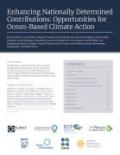This paper proposes a dashboard based on the two core planetary boundaries of climate change and nature loss. It demonstrates that a sustainability transformation through which we rebuild our world differently with nature is humanity’s best bet for the coming decades.

This paper outlines the best ways countries can use ocean-based action to curb greenhouse gas emissions and better adapt to the impacts of climate change. The paper focuses on four ocean-based subsectors that have the greatest potential to curb emissions and deliver significant other benefits: marine conservation (coastal and marine ecosystem restoration and protection), oceanic and coastal fisheries, marine transport, and ocean-based renewable energy.
This study aims to assess the employment creation potential of RE technologies based on future power sector scenarios for three GGGI Member countries: Mexico, Indonesia, and Rwanda. This report presents the results for Indonesia only.
This report provides a global framework and recommends an integrated energy approach, defined as “systemic efficiency”, as a solution to the current environmental, economic, health, and social crises.
The purpose of this learning brief is to share lessons and insights on how climate-related investments can support countries’ COVID-19 recovery efforts, drawing on recent evidence and experience in the Climate Investment Funds (CIF).
